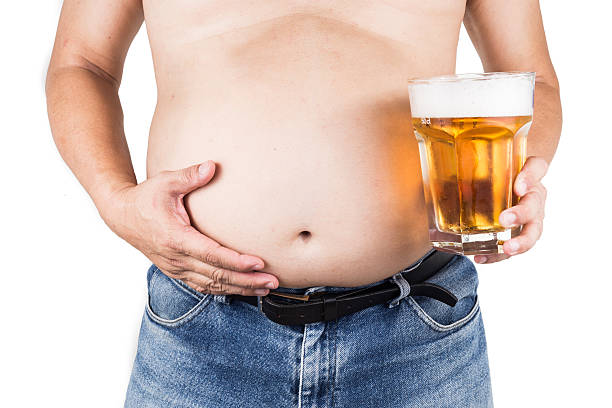A lot of research has been done lately on how beer does or does not contribute to a surging rate of obesity throughout the world. While nutritionists have mixed views on how and to what extent it can lead to weight gain, the dominant opinion suggests that beer does make you fat when consumed above a certain quantity consistently. And it does so in many ways, directly or indirectly.
Especially if you are on a weight loss regimen, beer is a strict no for you. Moreover, it is associated with a number of other disorders.
Although different bodies react differently to beer consumption, here are some of the established facts about alcohol’s impact on our bodies, especially when it comes to gaining weight.
- Beer is a Bit Too High on Calorie Count
Beer is a high-caloric, high-energy beverage. A pint of beer contains roughly 400 calories. A regular 12 fl. oz serving contains 153 calories.
When you are on a tight caloric budget, trying to shed those extra pounds, beer can certainly wreak havoc on your weight loss game.
Even if you are avoiding other sugary drinks, beer alone can add enough to your daily calorie count, and eventually, you’ll end up gaining a beer belly.
Table of Contents
Toggle1. It Increases your Hunger Levels
While beer consumption adds a lot to calorie consumption, on the other hand, it doesn’t really make you feel full. On the contrary, it actually produces a significant surge in hunger.
This means besides extra calories added by the beer itself, it will make you consume more food, leading you to accumulate more calories. So, the damage is double-fold. Alcohol leads to obesity by making you crave salty and oily foods.
Besides, alcohol in beer causes a considerable decrease in blood sugar levels. This results in an urge to rely on food rich in carbohydrates. People who already have a history of diabetes should be extra cautious here.
Despite the fact that beer is loaded with calories, one reason why it doesn’t make you feel satiated is that it is a liquid. In other words, your body doesn’t feel full unless you consume solid food as well. Hence you’ll end up snacking every now and then.
Moreover, beer messes up with those hormones which are related to the feeling of hunger in your body, thus making you feel hungry despite consuming lots of calories. This is how it manipulates your hunger system, and you eventually end up eating more than needed.
2. Beer Messes Up your Fat-Burning Metabolism
This is one of the most dangerous side effects of beer intake. Your body recognizes alcohol as a potential threat, and rightly so, because it can cause poisoning when consumed in large quantities. Your body thinks it needs to be intoxicated when you consume beer.
When the liver detects alcohol as a threat, it starts breaking it down into harmless units. In doing so, your body becomes too busy with alcohol, and it stops processing fats. Now, you guessed it right! The unprocessed fats start accumulating in your body, and you take up extra pounds, especially around the belly. This is usually referred to as – the beer belly.
This implies that even if you are eating healthful food which is low in calories, your body still ends up storing almost all the fat content because it has not been broken down to turn it into energy. Thus, taking beer means you are telling your body to stop breaking down fats.
3. Beer Disturbs your Hormonal Balance
Alcohol is known to disrupt the proper functioning of endocrine glands. Particularly, it messes up the levels of cortisol in the body. Cortisol, in turn, is closely related to the feeling of hunger.
As the cortisol levels increase, you feel more starved, and there is a constant temptation to eat. This overeating leads to obesity. However, since different bodies react differently, it would be hard to ascertain how much beer can actually be termed as more than enough for each person.
4. It can Lead to Sleep Disorders
People usually consume alcoholic beverages to relax and unwind. However, the continuous overconsumption of alcohol can actually lead to sleep deprivation.
Overindulgence in alcohol is known to be a leading cause of insomnia. People consuming beer regularly have problems falling asleep and staying asleep. Both the quality of sleep and its duration can be affected. And sleep deprivation is directly linked to obesity.
According to a study conducted in 2016, it was noted that participants of the study who were sleep-deprived were more prone to overeating. Thus they were more likely to gain weight.
Conclusion
A lot of research to date suggests that beer can cause excessive weight gain, especially around the belly, when consumed constantly. Although moderation is the key to avoiding obesity, there are a number of other problems associated with alcohol consumption.
Over time, alcohol can lead to cardiac disorders, mental health issues, cancer, and liver problems.
Above all, it keeps you from adopting a healthy lifestyle, whether it is about healthy eating habits or working out. If you had a hangover last night, you are less likely to wake up feeling like going jogging or eating light and healthy food.

I am a passionate beer connoisseur with a deep appreciation for the art and science of brewing. With years of experience tasting and evaluating various beers, I love to share my opinions and insights with others and I am always eager to engage in lively discussions about my favorite beverage.
















